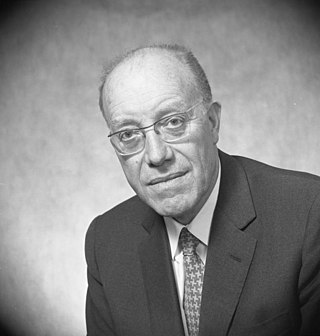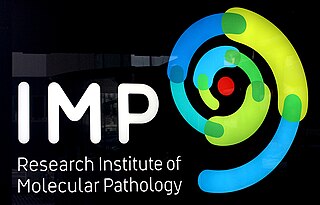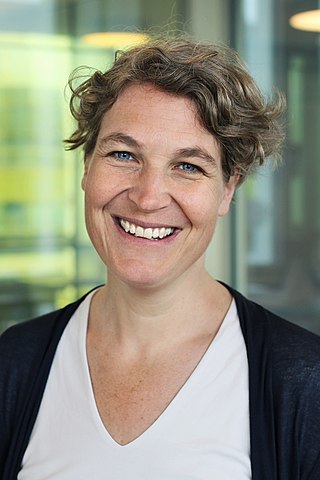Related Research Articles
The Gottfried Wilhelm Leibniz Prize, in short Leibniz Prize, is awarded by the German Research Foundation to "exceptional scientists and academics for their outstanding achievements in the field of research". Since 1986, up to ten prizes are awarded annually to individuals or research groups working at a research institution in Germany or at a German research institution abroad. It is considered the most important research award in Germany.
Franz-Ulrich Hartl is a German biochemist and Managing Director of the Max Planck Institute of Biochemistry. He is known for his pioneering work in the field of protein-mediated protein folding and is a recipient of the 2011 Lasker Award along with Arthur L. Horwich.
The Heinz Maier-Leibnitz-Preis, in honor and memory of the German physicist Heinz Maier-Leibnitz, is funded by the Bundesministerium für Bildung und Forschung, and it is awarded by a selection committee appointed by the Deutsche Forschungsgemeinschaft and the BMBF. Since 2013, there are ten recipients of the prize and each receives 20,000 Euros, which is an increase over the original 16,000 Euros that had been given to six recipients per year until 2012.

Heinz Maier-Leibnitz was a German physicist. He made contributions to nuclear spectroscopy, coincidence measurement techniques, radioactive tracers for biochemistry and medicine, and neutron optics. He was an influential educator and an advisor to the Federal Republic of Germany on nuclear programs.

The Research Institute of Molecular Pathology (IMP) is a biomedical research center, which conducts curiosity-driven basic research in the molecular life sciences.
Dietmar Vestweber is a biochemist and cell biologist. He is the founding director of the Max Planck Institute for Molecular Biomedicine in Münster, Germany.
Ralf Heinrich Adams is a biochemist and cell biologist. He is director at the Max Planck Institute for Molecular Biomedicine and head of the Department of Tissue Morphogenesis in Münster, Germany.
Jörg Vogel is a German scientist in the field of RNA biology and microbiology. He holds a position as full professor, chairs the Institute for Molecular Infection Biology (IMIB) at the University of Würzburg, Germany, and is a founding Helmholtz-Institute director. Vogel studied biochemistry at the Humboldt University of Berlin and the Imperial College London. After his PhD work (1996–1999) he performed postdoctoral research at the Uppsala University, Sweden and was an EMBO fellow at the Hebrew University Jerusalem, Israel. From 2004 to 2009 he was a group leader at the Max Planck Institute for Infection Biology. Since 2009 he is a full professor at the IMIB and head of the institute as successor to Jörg Hacker. Furthermore, he is founding director of the Helmholtz-Institute for RNA-based Infection Research (HIRI) in Würzburg that was established in 2017.

Roger Sidney Goody is an English biochemist who served as director at the Max Planck Institute for Molecular Physiology in Dortmund from 1993 until 2013. Since 2013 he is Emeritus Director of the institute.

Andreas Plückthun is a scientist whose research is focused on the field of protein engineering. Andreas Plückthun is the director of the department of biochemistry at the University of Zurich. Plückthun was appointed to the faculty of the University of Zurich as a Full professor of biochemistry in 1993. Plückthun was group leader at the Max Planck Institute of Biochemistry, Germany (1985-1993). He was elected to the European Molecular Biology Organization (EMBO) in 1992, and named a member of the German National Academy of Science (Leopoldina) in 2003. He is cofounder of the biotechnology companies Morphosys Molecular Partners AG and G7 Therapeutics..
Elly Margaret Tanaka is a biochemist and senior scientist at the Research Institute of Molecular Pathology (IMP) in Vienna, Austria. Tanaka studies the molecular cell biology of limb and spinal cord regeneration as well as the evolution of regeneration.
Hartmut Beug (1945–2011) was a German cancer biologist who studied how groups of oncogenes interact to lead to the development and spread of cancer. Shortly before his death, a foundation was set up in his and his wife’s name to support collaboration among young scientists and their studies in the field of metastasis.

Erwin Friedrich Wagner is an Austrian biochemist known for his research on the molecular basis of cancer and associated conditions such as inflammation and cachexia. He was Deputy Director of the Spanish National Cancer Research Center (CNIO) in Madrid, Spain until 2019. Since 2019, Wagner is a group leader affiliated with the Medical University of Vienna.
Jan-Michael Peters is a cell- and molecular biologist. Since 2013, he is Scientific Director of the Research Institute of Molecular Pathology (IMP) in Vienna.
Alexander Stark is a biochemist and computational biologist working on the regulation of gene expression in development. He is a senior scientist at the Research Institute of Molecular Pathology (IMP) at the Vienna Biocenter and adjunct professor of the Medical University of Vienna.
Elena Conti is an Italian biochemist and molecular biologist. She serves as Director and Scientific Member of the Max Planck Institute of Biochemistry in Martinsried, Germany, where she uses structural biology and biophysical techniques to study RNA transport and RNA metabolism. Together with Elisa Izaurralde, she helped characterize proteins important for exporting mRNA out of the nucleus.
Elisa Izaurralde was an Uruguayan biochemist and molecular biologist. She served as Director and Scientific Member of the Department of Biochemistry at the Max Planck Institute for Developmental Biology in Tübingen from 2005 until her death in 2018. In 2008, she was awarded the Gottfried Wilhelm Leibniz Prize, shared with Elena Conti, for "fundamental new insights into intracellular RNA transport and RNA metabolism". Together with Conti, she helped characterize proteins important for exporting mRNA out of the nucleus and later in her career she helped elucidate mechanisms of mRNA silencing, translational repression, and mRNA decay.
Meinrad Busslinger is a biochemist and immunologist, renown for his work on B cells. He is a Senior Scientist and Scientific Deputy Director of the Research Institute of Molecular Pathology (IMP) in Vienna, Austria.

Dirk Schübeler is a German researcher, Director of the Friedrich Miescher Institute for Biomedical Research (FMI) and professor at the University of Basel. He is an expert in gene regulation.

Andrea Pauli is a developmental biologist and biochemist studying how the egg transitions into an embryo, and more specifically the molecular mechanisms underlying vertebrate fertilisations, egg dormancy, and subsequent egg activation. Her lab uses zebrafish as the main model organism. Andrea Pauli is a group leader at the Research Institute of Molecular Pathology (IMP) at the Vienna Biocenter in Austria.
References
- ↑ https://www.dfg.de/download/pdf/gefoerderte_projekte/preistraeger/hml-preis/2003/clausen_lebenslauf.pdf [ bare URL PDF ]
- 1 2 Pathology, The Research Institute of Molecular. "Tim Clausen - Protein Quality Control - Research Institute of Molecular Pathology (IMP)". The Research Institute of Molecular Pathology.
- ↑ "Tim - IMP Clausen Group". clausen.imp.ac.at.
- ↑ Pathology, The Research Institute of Molecular. "Tim Clausen appointed Senior Scientist".
- ↑ "DFG - Deutsche Forschungsgemeinschaft - Dr. Tim Clausen - Heinz Maier-Leibnitz-Preisträger 2003". www.dfg.de.
- ↑ "Find people in the EMBO Communities". people.embo.org.
- ↑ "ERC Funded Projects". 22 February 2017.